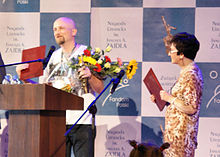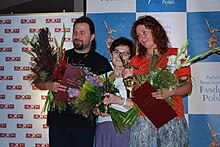Janusz A. Zajdel Award
This article needs additional citations for verification. (August 2016) |
| Janusz A. Zajdel Award | |
|---|---|
 The statuette of the Janusz A. Zajdel Award. | |
| Country | Poland |
| Presented by | the Polish science fiction and fantasy fandom |
| First awarded | 1984 |
| Website | zajdel |



The Janusz A. Zajdel Award (Nagroda imienia Janusza A. Zajdla), often called just Zajdel, is the annual award given by the Polish science fiction and fantasy fandom for the best stories published in the previous year. The winners are chosen in a vote by fans present at the Polcon convention from up to five nominations in each of two categories:
- Novel: works longer than 100 standard pages (of 1800 characters),
- Short story: shorter works.
Instant-runoff voting with "No award" as one of the choices is the method used. Vote counts are not announced.
History[]
The award was created in 1985 under the name Sfinks (not to be confused with the , an award of the magazine). After the death of the first winner Janusz A. Zajdel in the same year, the name was changed in his memory.
Until 1989, the award was given by Polish science fiction fan associations, voting as units; since 1990, all fans present at Polcon can vote.
Until 1991, there was a single award given for the best story; since 1992, there are two categories: novel and short story.
In 2014, a free online e-book of the stories nominated for year 2013 was made available.[1]
Winners[]
The year given is the year of publication. Since 1992, novels and short stories have been judged separately.
| Year | Novel | Short story |
|---|---|---|
| 1984 | Janusz Andrzej Zajdel, Paradyzja | |
| 1985 | Marek Baraniecki, | |
| 1986 | no award | |
| 1987 | no award | |
| 1988 | Edmund Wnuk-Lipiński, Rozpad połowiczny | |
| 1989 | no award | |
| 1990 | Andrzej Sapkowski, Mniejsze zło | |
| 1991 | Marek S. Huberath, | |
| 1992 | Feliks Wiktor Kres, | Andrzej Sapkowski, Miecz przeznaczenia |
| 1993 | no award | Andrzej Sapkowski, |
| 1994 | Andrzej Sapkowski, Krew elfów | Ewa Białołęcka, |
| 1995 | Rafał Aleksander Ziemkiewicz, Pieprzony los kataryniarza | Konrad Tomasz Lewandowski, |
| 1996 | Tomasz Kołodziejczak, | Rafał A. Ziemkiewicz, |
| 1997 | Marek S. Huberath, | Ewa Białołęcka, |
| 1998 | Rafał A. Ziemkiewicz, Walc stulecia | Anna Brzezińska, |
| 1999 | Marek S. Huberath, Gniazdo światów | Antonina Liedtke, |
| 2000 | Anna Brzezińska, | Jacek Dukaj, Katedra |
| 2001 | Jacek Dukaj, Czarne oceany | Andrzej Ziemiański, |
| 2002 | Andrzej Sapkowski, Narrenturm | Andrzej Pilipiuk, |
| 2003 | Jacek Dukaj, Inne pieśni | Andrzej Ziemiański, |
| 2004 | Jacek Dukaj, Perfekcyjna niedoskonałość | Anna Brzezińska, |
| 2005 | Jarosław Grzędowicz, | Jarosław Grzędowicz, |
| 2006 | Jarosław Grzędowicz, | Maja Lidia Kossakowska, |
| 2007 | Jacek Dukaj, Lód | Wit Szostak, Miasto grobów. Uwertura |
| 2008 | Rafał Kosik, Kameleon | Anna Kańtoch, Światy Dantego |
| 2009 | Anna Kańtoch, Przedksiężycowi, tom 1 | Robert M. Wegner, Wszyscy jesteśmy Meekhańczykami |
| 2010 | Jacek Dukaj, Król Bólu i pasikonik | Anna Kańtoch, Duchy w maszynach |
| 2011 | Maja Lidia Kossakowska, Grillbar Galaktyka | Jakub Ćwiek, Bajka o trybach i powrotach |
| 2012 | Robert M. Wegner, Niebo ze stali | Robert M. Wegner, Jeszcze jeden bohater |
| 2013 | Krzysztof Piskorski, Cienioryt | Anna Kańtoch, Człowiek nieciągły |
| 2014 | Michał Cholewa, Forta | Anna Kańtoch, Sztuka porozumienia |
| 2015 | Robert M. Wegner, Pamięć wszystkich słów | Robert M. Wegner, Milczenie owcy |
| 2016 | Krzysztof Piskorski, Czterdzieści i cztery | Łukasz Orbitowski and , Wywiad z Borutą |
| 2017 | Rafał Kosik, Różaniec | , Szaławiła |
| 2018 | Robert Wegner, | , Pierwsze słowo |
| 2019[2] | , [A Tale of the Serpent's Heart or the Second Word about Jakub Szela] |
Marta Potocka, "Chomik" ["Hamster"] |
Winner summaries[]
2019: Radek Rak, Baśń o wężowym sercu...[]
The novel is loosely based on the legends about Jakub Szela, the leader of a 1846 peasant uprising known as the Galician slaughter. It gained several other literary awards.[3]
2019: Marta Potocka, "Chomik"[]
Marta Potocka is a young writer, with several short stories. She works as a programmer. Her winning work "Chomik" ["Hamster"] was published in the e-zine , no. 5, 2019. The story is set in the near future Poland. The heavily criticized Social Insurance Institution is closed and the basic social security payment is introduced to everybody subject to the condition that to qualify for it the person must join the program of Social Monitoring. The Social Insurance Institution is replaced with the Social Balance Institution, whose function is to control that people spend as much money as possible. Those who do not want to spend are called "hamsters", i.e., "hoarders". An employee of SII tries to handle a particularly tough "hamster" and fails, but instead uncovers a much larger problem. [3] Chomik is available online.[4]
References[]
- ^ "Opowiadania nominowane do Zajdla jako e-booki!" Archived 2014-09-14 at the Wayback Machine, July 9, 2014 (retrieved August 18, 2014)
- ^ Nominacje Nagrody Fandomu Polskiego im. Janusza A. Zajdla w latach 2010−2019
- ^ a b Radek Rak i Marta Potocka laureatami Nagrody im. Janusza A. Zajdla za 2019 rok
- ^ Chomik , Marta Potocka
External links[]
| Wikimedia Commons has media related to Janusz A. Zajdel Award. |
- The Award homepage (in Polish)
- Polish science fiction awards
- Polish awards
- Polish literary awards
- Awards established in 1985
- Janusz Zajdel
- 1985 establishments in Poland